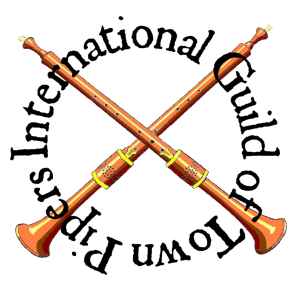CHRISTMAS WAITS
The Every Day Book, William Hone (1780-1842 ), 2 Vols. London: William Tegg, 1825, 1827.
The musicians who play by night in the streets at Christmas are called waits. It has been presumed, that waits in very ancient times meant watchmen; they were minstrels at first attached to the king’s court, who sounded the watch every night, and paraded the streets during winter to prevent depredations.
In London, the waits are remains of the musicians attached to the corporation of the city under that denomination. They cheer the hours of the long nights before Christmas with instrumental music. To denote that they were “the lord mayor’s music,” they anciently wore a cognizance, a badge on the arm, similar to the represented in the engraving below, from a picture by A. Bloemart.
He blows his bagpipe soft or strong, Or high or low, to hymn or song, Or shrill lament, or solemn groan, Or dance, or reel, or sad o-hone! Or ballad gay, or well-a-day— To all he gives due melody.
Preparatory to Christmas, the bellman of every parish in London rings his bell at dead midnight, that his “worthy masters and mistresses” may listen, and be assured by his vocal intonation that he is reciting “a copy of verses” in praise of their several virtues, especially their liberality; and, when the festival is over, he calls with his bell, and hopes he shall be “remembered.”
Hence the custom of “boxing” as it is termed, still in practice in all parts of England, and probably with as much eagerness as ever, as the following amusing notification from the Harp Waits of Pentonville (delivered Christmas 1830), may serve partly to testify:-
HARP WAITS
To the Ladies and Gentlemen residing in the Neighbourhood of Pentonville.
Ladies and Gentlemen, With sensible recollection of by-gone Patronage, your ‘Wandering Melodists and Christmas Waits’ beg to offer their best compliments on the approaching festival. The band on this occasion, as histherto, has been select, and trusts to merit that liberal; diffusion of your favouyrs, which has enlivened their homes and cheered their hearts for a series of years. We trust our sprightly notes of melody, awakening sweet Echo on the dull Ear of Night, has stolen on your gentle slumbers, and again lulled you to repose with the soothing cadenza of the Lullaby.
James Putnam, violon, No. 1, Bagnigge Place
Joseph Perry, No. 26, Duke Street, BloomsburyHaving redeemed our pledge, we shall have the honour of paying our personal respects in the holiday week.
CAUTION: In respectfully taking our leave, we beg to caution Ladies and Gentlemen against being imposed upon, by a set of men who go about collecting, but have never played. To prevent such imposition, we beg to say, that when we call, we will produce the harp with which we have performed our duty. Ladies and Gentlemen, we humbly entreat you not to give your donation till the harp is produced.
